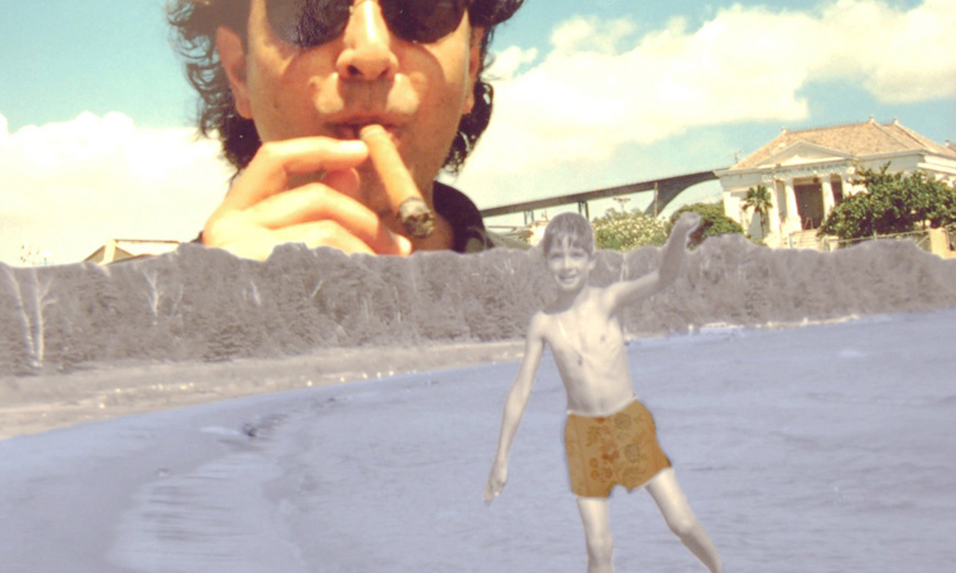Dave
by Emily May
image by Shay Spaniola
My next-door neighbor, over for dinner with his wife at my parents’ house a week before I leave for the other side of the world: “Have you thought about certain things? It’s 120 degrees every day. You might want to cut your hair before leaving.”
No, I had not thought of arriving nearly bald in Southeast Asia, like he had done 4 decades earlier, when he was drafted and packed up on a plane for Vietnam.
“Memorial Day, Veterans Day, I don’t get into patriotism. Other people can plant trees,” he says, lifting a brown bottle to his mouth. “I’ve done my duty, I don’t care anymore.” His rage is a grenade he knows will never detonate: silent, calmly tossed between palms, the burden of someone who has been shipped around the world against his will to kill or die or sit around. But his smoldering collection of memories has oxidized into something barely recognizable. He owns them, has wrapped them tidily, rendered them small and light, portable, stashed deep under the loose Hawaiian shirts his wife hates lovingly. “It’s all bullshit.”
He is bespectacled and hollow-cheeked, long and thin and thoughtful; could be your anthropology professor, really. His tone is clipped and matter-of-fact; he is not angry or bitter or distraught. He is only a man who did as he was commanded to do, and has spent the rest of his life trying to separate himself from it: the submission, the powerlessness to the whims of morally dubious and unspeakably massive olive-hued entities. Now he is a man who does not take orders, does not believe in The Cause. He owns a landscaping business; works just part time now and is looking to sell. He is the neighborhood busybody: knows where everyone’s going, meets everyone who’s coming. He tends a vegetable garden and leaves zucchinis on the neighbors’ porches.
We match beers on my parents’ porch; I want to ask him more, ask him everything. Whose blood did you see. Whose blood did you spill. What did you lose. What did you smoke.
At five or six, I asked my mother when the world became color, a child’s self-referential worldview that betrayed a deep, romantic affinity for the dead, distant past. Around eleven or twelve, as an indulged child of the strip-malled suburban nineties and all their vacant decadence, I hardly unbuttoned my frayed hip huggers long enough to wash them, and harbored a real jealousy of my parents’ firsthand knowledge of an era of such enduring cultural and sartorial weight. My Nick-at-Nite-obsessed elementary years gave way to a singular fixation on classic rock radio during high school; I must have been born, or perhaps doomed, to believe that everything true—everything that mattered—had happened long before I did. I longed for the groomed refinement of that monochrome reality, the simple palette, when all the gaudy complications of the world were compressed into the humble and elegant spectrum of grays.
To the neon glut of my youth, the Vietnam War, with its faint and utterly inexplicable air of Americans doing something they didn’t want to do, remained an otherworldly mystery. Decades after it ended, in a billboarded world of inane sloganeering and minivan commercials, its presence remained tangible as a curious vestige of a world that predated the Contempo Casuals store where I had bought the treasured hip huggers. And now, I’m still just a child digging in the backyard for a shiny secret to stare at. But there are some things one does not just unearth, and truths gleaned from The War are one of them.
“Oh, the drugs. There were drugs. I tried some,” he says, and stops. He has two grown daughters. They’ve left here for cities, work as artists, live with their boyfriends.
“When I met him on campus, he looked like he just rolled out of the fields,” his wife says now, smiling, almost four decades later. “He couldn’t cook for himself. He could barely speak.”
“We spoke pidgin English over there, ‘we get booze.’” he says. “I never saw any action; I spent eleven months driving friends to and from the commissary. The Portuguese had a nice deal with the US government; their wine was cheap.”
He wonders why I wouldn’t want to work for Wells Fargo, save a bit of money for now and get some management experience.
Perhaps he can’t comprehend the wars I’ll never be asked to fight. Or the ones I will: circular and small, the weight and width of an eyelash in comparison. I’ll be boarding that plane bound for the other side of the world. Of my own volition.
Later, someone drops a wine glass; invisible slivers scatter across black kitchen tile. Dave licks his finger, bends his stretched frame over with a casual precision, and picks up a shard of glass. His wife watches, forty years melt away and she remembers why she loved him in the first
place. ◥
Emily May was born in the backseat of a greyhound bus when Ronald Reagan was president and has since lived in more places than she can count/bore you with. She is currently considering improving her credit score and Quaaludes. She lives with her Steely Dan records in Boston, Massachusetts.








